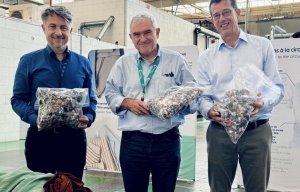
Accelerating the biorecycling supply chain
Platform will help validate the biorecycling technology for textiles at demonstration plant scale.

3rd October 2023
Innovation in Textiles
|
Clermont-Ferrand, France
Carbios has this week inaugurated its textile preparation for recycling line at its demonstration plant in Clermont-Ferrand, France, in the presence of French Minister for Industry Roland Lescure.
To streamline the textile preparation phase, which is currently carried out by hand or on several lines, Carbios has developed a fully integrated and automated line that transforms textile waste from used garments or cutting scraps into the raw material suitable for depolymerization with its enzymatic biorecycling process.
This patented line integrates all preparation stages including shredding and the extraction of hard materials such as buttons or fasteners and provides Carbios with a high-performance, scalable development tool.
The platform will help validate the biorecycling technology for textiles at demonstration plant scale and the company is working with collection and sorting operators to specify the quality of textiles and the preparation steps needed to make them suitable for enzymatic recycling. The expertise gained will also be invaluable to brands in the eco-design of their products.
“Textile recycling is a major issue, as the need for solutions to manage the life cycle of these products is critical – worldwide, only 13% of textile waste is currently recycled, with the remaining 87% ending up in landfill or incineration,” said Lescure. “Carbios is contributing to the creation of a French recycling industry and thanks to its know-how and innovative, collaborative spirit, is providing a solution – cutting-edge and made in France – to what was until now a real obstacle to textile recycling.”
Current collection, sorting and preparation infrastructures limit the amount of textile waste available for fibre-to-fibre recycling. Collection rates average around 15-25% worldwide, and much of the waste collected is exported to Africa, Asia or Latin America for sorting.
In addition, textiles are highly complex materials, with yarns of different composition that are difficult, if not impossible, to physically separate. However, the highly selective enzyme developed by Carbios can specifically depolymerize the PET polyester present in textile materials.
“Textile preparation is an essential step for recycling and without it there is no recycling industry, and no textile circularity,” added Emmanuel Ladent, CEO of Carbios. “The output from our new preparation line is ready to be directly integrated into our biorecycling process, which enables closed-loop fibre-to-fibre recycling in response to a strong demand from the brands we work with. I would like to thank the French Government for its support throughout the industrialisation of our technology.”
The capacity of the new line is 300kg per hour in a continuous process.

Business intelligence for the fibre, textiles and apparel industries: technologies, innovations, markets, investments, trade policy, sourcing, strategy...
Find out more